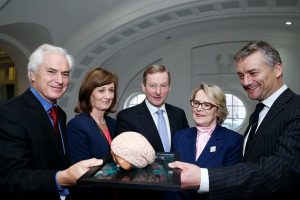To Tackle Dementia, Trinity’s Global Brain Health Initiative Set to Begin Training New Fellows
Resource type: News
The University Times | [ View Original Source (opens in new window) ]
The first group of fellows come from a range of disciplines, and will be responsible for addressing the causes and challenges of dementia.

By Niamh Egleston, Deputy News Editor
The Global Brain Health Institute (GBHI), which is jointly based in Trinity and the University of California, San Francisco (UCSF), has begun training its first intake of Atlantic Fellows – a group of experts from across disciplines that the institute hopes will become “change agents” in the fight against dementia.
These are the first group of fellows, but the expectation is that eventually eight will be drawn each year, from a wide selection of disciplines. Over the next 15 years, the institute plans to train 600 international fellows and scholars.
The experts will receive training in key areas such as prevention, diagnosis, assessment and management arc of the dementia spectrum, before graduating to become Atlantic Fellows, who, according to a press release, “go on to be advocates and leaders in brain health, implementing programs throughout the globe to help prevent or lessen the impact of cognitive impairment”.
In addition, they will receive instruction in “communications, health economics, brain protection, dementia prevention, and public policy”.
GBHI was established last year following a €138 million donation – the largest in Irish history – from Irish–American billionaire Chuck Feeney’s foundation, Atlantic Philanthropies. At the time, the donation and the creation of the institute garnered much national and international attention, with the donation praised by An Taoiseach Enda Kenny, and the launch covered by the national press andTimes Higher Education .
The trainees come from Ireland, the Netherlands, and Spain. The first of these, Dominic Campbell, is former Artistic Director of the St Patrick’s Day Festival. Campbell co-founded Creative Ageing International, an Irish company which aims to “encourage creativity as an element of care for the elderly”, according to the GBHI website. His work aims to maintain what the Co-Director of the GBHI, Prof Ian Robertson, refers to in a video, released by the institute this morning, as “cognitive reserve” – mental stimulation which is crucial to reducing the incidence of dementia – through art and culture.
Joining him will be Spanish cognitive neurologist Dr Mircea Balasa, who will build on his expertise in diagnosing dementia, gained during his time as Chief Resident in Neurology at Hospital Clinic of Barcelona. Balasa will work on ways to ensure earlier and more precise diagnosis of dementia.
Dr Geeske Peeters, who is a Senior Research Fellow at the School of Public Health and Preventive Medicine, Monash University, Melbourne, Victoria, Australia, will use her time in the programme to research the risk factors that contribute to falling in older people, particularly those suffering from dementia. This will culminate in the creation of an interdisciplinary network of experts in the delivery of public health campaigns to develop preventative strategies against falling.
Completing the group is Dr Adria Rofes, a cognitive neuroscientist and linguist, also from Spain. His research centres around early assessment for dementia, with the aim of developing assessments that are “much less obtrusive and much more sophisticated than before”, according to Robertson.
Speaking to The University Times last November after the opening of the GBHI, co-director of the institute, Brian Lawlor, who is also the Connolly Norman Professor of Old Age Psychiatry, expressed his hope that the institute might even be able to exceed the planned 600 fellows and scholars.
“We plan to try and develop other partners, and hopefully they will fund and support other fellows and scholars as well”, Lawlor said.
It is estimated by the World Alzheimer Report 2015 that 47 million people worldwide suffer from dementia, a figure which is estimated to triple by 2050, reaching in excess of 132 million people. There is currently no known cure, prevention, or effective treatment for the disease.
The initiative is an innovative, multi-disciplinary approach to what Rofes describes in the video as the “epidemic” of dementia. A large problem with the fight against dementia, according to Robertson, is the fact that is the fact that it is viewed more as a natural side-effect of the ageing process than a disease, as well as the sense of hopelessness many associate with the disease. These are perceptions that the GBHI hopes to change. According to Robertson: “We want to do for dementia what has happened for cancer. We want to change people’s perception of it and get away from a feeling of despair to one of optimism.”
The outward expansion of the GBHI is set to continue in the future, with the institute hoping to recruit at least half of its fellows from outside of Ireland and the US, with a particular focus on Latin America.
Learn More
Global Brain Health Institute is an Atlantic grantee.